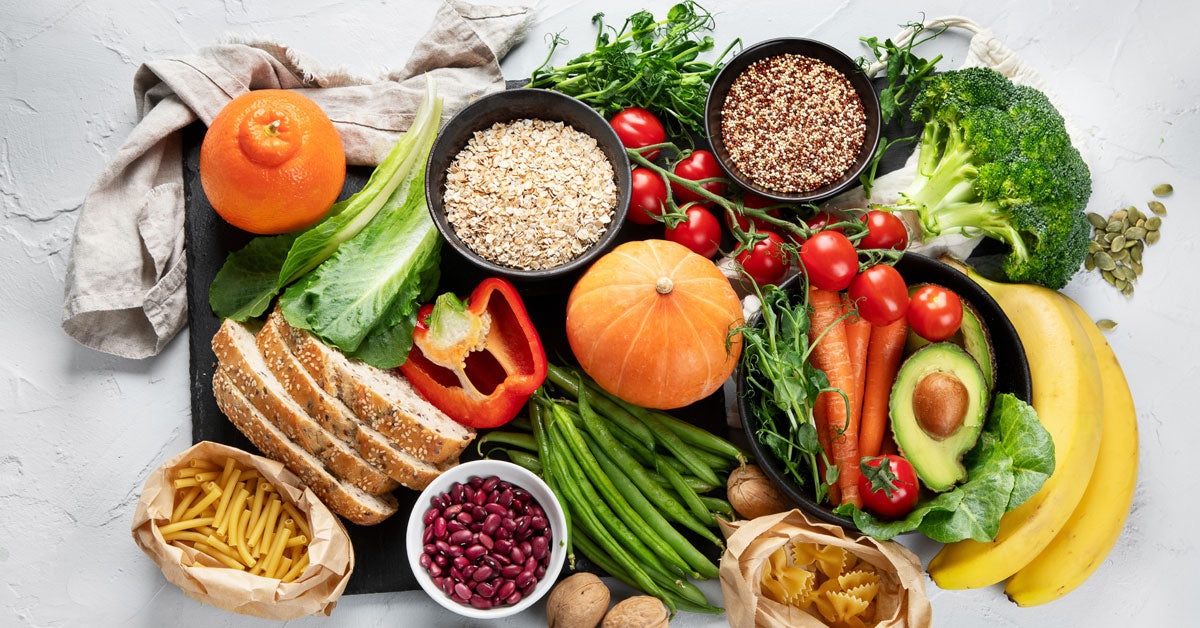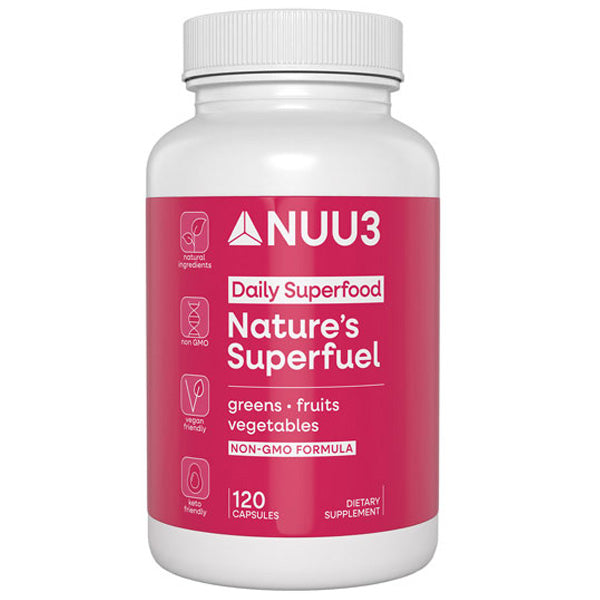High-Fiber Foods Chart: How Fiber Help Overcome Constipation?

Constipation is a common digestive issue that most of us have experienced at some point in our lives. In addition to the fact that it’s unpleasant, it can also have a negative impact on digestive health and general well-being. It’s important to note that the foods you eat affect your gut micro biome, and may either contribute to constipation or help to relieve the issue.
Many people wonder, “Can too much protein cause constipation?” It can, however, it’s also important to take into account your intake of fiber, which is vital in promoting regular bowel movements and optimizing digestive health. Insufficient fiber intake may contribute to constipation, but this problem is easy to remedy by modifying your diet.
In this article, we’ll discuss the benefits of adding more fiber to your diet, and provide you with the high-fiber foods chart for constipation. Knowing what foods to eat to increase your fiber intake is the first step in promoting healthy bowel movements and optimizing your digestion.
What is Dietary Fiber?
Dietary fiber is the indigestible component of plant foods. Since the human body is not able to process fiber, it passes through the digestive system and provides a wide range of health benefits along the way.
Dietary fiber can be divided into two categories, which are soluble and insoluble. The soluble fiber dissolves in water, and it forms a gel-like substance in your digestive tract. Good sources of soluble fiber include healthy, nutrient-rich foods like oats and beans.
On the other hand, insoluble fiber doesn’t dissolve in water, so it adds bulk to your stool and helps promote healthy bowel movements. You can get insoluble fiber by adding more fruits and vegetables to your diet, including corn, kale, eggplant, green beans, grapes, kiwi, rhubarb, and pineapple. Later in this article, we’ll provide you with a detailed high-fiber foods chart for constipation.
What is the Recommended Daily Fiber Intake?
According to the Food and Drug Administration[1] , the recommended daily fiber intake for adults on a 2000-calorie diet is 28g. The ideal amount of fiber you should consume also varies by age and gender.
The USDA’s Dietary Guidelines for Americans[2] suggests that women under the age of 50 consume 25 to 28g of fiber daily, while for men in the same age group, they recommend 31 to 34g.
Additionally, they state that women 51 and older require 22g of daily fiber, while men should consume 28g. Children and adolescents need 14 to 31g of fiber each day for optimal health and development.
Even though fiber can easily be added to your diet, the average American eats only 16.2 grams per day according to a study published in the American Journal of Lifestyle Medicine[3]. If you are also consuming less than the recommended daily intake, you can fix the issue by consulting the high-fiber foods chart for constipation we will provide in the next section.
Adhering to the required daily intake can help significantly in overcoming constipation, while insufficient intake of fiber and other nutrients can worsen the issue. Can too much protein cause constipation? Yes, an overload of protein also contributes to this digestive health issue.
Best Dietary Sources of Fiber
Take a look at the chart for constipation to learn more about the best sources of fiber[4] to add to your diet.

Benefits of a High-Fiber Diet For Constipation
Dietary fiber is essential for relief of constipation, but it also provides a number of additional health benefits. By enriching your diet with nutrition from the high-fiber foods chart for constipation, you can expect some of the following advantages.
1. Promotes Regular Bowel Movements
Dietary fiber promotes healthy, regular bowel movements by adding bulk and softness to your stool. As a result, it can pass through the digestive tract more easily and decrease your chances of becoming constipated.
Fiber can also help with loose, watery stools because it absorbs liquid as it passes through the digestive tract. Follow our high-fiber foods chart to enrich your diet and support regular bowel movements.
Optimal digestion is crucial to overall health and well-being, so we suggest complementing your nutritional regimen with Nuu3 Nature’s Superfuel. This nutrient-rich super food supplement promotes a healthy microbiome for better digestion, boosts energy levels, supports heart health, and strengthens the immune system.
2. Supports Bowel Health
Fiber also plays an essential role in bowel health, so following the high-fiber foods chart to promote regular bowel movements can reduce your risk of developing conditions like constipation, irritable bowel syndrome, or inflammatory bowel disease.
In addition, healthy bowel movements eliminate toxins and waste that could negatively impact your digestion. Regular elimination of fecal matter helps promote the growth of good bacteria, balance the gut microbiome [5], enhance nutrient absorption, and optimize bowel function.
We also recommend that you adopt other health habits that support bowel function, like regular physical activity. Does exercise make you poop? It’s a well-known fact that it does, making it as important as high fiber consumption when it comes to relieving constipation.
3. Lowers Cholesterol
The benefits of a high-fiber diet also include lowering cholesterol levels, and research shows[6] that it may decrease both total and LDL levels. This occurs because soluble fiber binds to cholesterol in the small intestine and prevents it from entering the bloodstream.
Fiber can also lower your levels by promoting regular bowel movements, as irregularity can cause constipation leading cholesterol to get reabsorbed into the bloodstream. Can too much protein cause constipation? We’ve said that it can and this may lead to higher cholesterol levels, so make sure to include sufficient fiber in your diet.
4. Regulates Blood Sugar Levels
Soluble dietary fiber slows the absorption of sugar from the digestive tract and helps regulate blood glucose levels. It does this by taking on a gel-like form in your gut that delays the release of glucose into your bloodstream and prevents a blood sugar spike[7]. This keeps your blood sugar levels stable, reducing the risk of insulin resistance and type 2 diabetes.
Following a high-fiber diet is particularly important for those with diabetes, as people with this condition are prone to constipation. It’s just as important as weekly physical activity, as we've said. Not only does exercise make you poop, but so does the fiber.
5. Helps You Maintain a Healthy Weight
Dietary fiber supports weight management because it slows digestion to make you feel full for longer, which suppresses your appetite[8] so you don’t overeat. To lose weight, you have to create a calorie deficit, meaning you are burning more calories than you are consuming. To stay at your current weight, your consumption and expenditure must be equal. Taking in an adequate amount of fiber daily can help significantly in maintaining your desired body weight.
6. Reduces the Risk of Developing Intestinal Cancer
Fiber intake helps to prevent intestinal cancer by binding carcinogens to the stool and expelling them from your body. In addition, the healthy probiotic bacteria in your colon can convert the fiber into short-chain fatty acids that reduce the risk of the intestinal cells becoming cancerous. Dietary fiber also promotes healthy bowel movements and balances the gut microbiome, both of which protect against intestinal cancer.
Daily To-Dos to Help You Poop
If you’re struggling with constipation, a few simple changes in your lifestyle can help you tackle the problem successfully. Here’s what you can do:
-
DO start your morning with a warm drink like coffee or caffeinated tea to kickstart your bowel muscles.
-
DO engage in gut-stimulating physical activities like jogging or abdominal exercises. Not only does exercise make you poop, but it also helps boost energy levels and keep you motivated.
-
DO sit on the toilet for 5 to 10 minutes even if you don’t need to have an urgent bowel movement.
-
DO stay hydrated during the day by drinking plenty of water.
-
DO eat fiber-rich foods and opt for healthy meals.
-
In addition to following a nutritious diet, DO take supplements like Nuu3 Gut Health 365 to maintain optimal health and digestion.
-
DO drink a healthy gut tonic in the evening to help promote regular bowel movements. Simply combine one tablespoon of chia seeds with a cup of water, fresh lemon juice, and a pinch of cayenne pepper.
Frequently Asked Questions
Can too much protein cause constipation?
Yes, too much protein can cause constipation if your diet is also low in fiber, which is necessary for regular bowel movements. Not only can too much protein cause constipation, but it also increases your risk of developing other symptoms like headaches, bad breath, intestinal discomfort, and indigestion.
Why am I constipated even though I eat a healthy diet?
If you follow a healthy diet but are still constipated, it could be due to low fiber intake, lack of physical activity, dehydration, stress, or medical conditions such as irritable bowel syndrome (IBS). In addition, antacids, antidepressants, cold pills, some blood pressure medications, calcium and iron supplements, and opioids all have constipation as a possible side effect.
To prevent or relieve this issue, modify your diet by following the high-fiber foods chart for constipation. In addition, drink plenty of water daily, manage your stress levels, and engage in more physical activity.
Can drinking water help with constipation?
Yes, drinking water can help ease constipation, as staying hydrated softens stool so it passes through the digestive tract more easily and promotes healthy bowel movements. For this reason, it’s important to drink about 8 glasses of water daily, especially if you are constipated. In addition to increasing your water intake, take a look at our high-fiber foods chart and introduce more of this nutrition into your diet.
What are other methods for relieving constipation?
Other ways to relieve constipation include dietary changes, and the high-fiber foods chart can help you in this regard. In addition, engaging in regular exercise, taking laxatives and stool softeners, using probiotics and herbal remedies, and bowel training are helpful methods. Bowel training involves establishing a regular schedule so that you train yourself to have a bowel movement at approximately the same time each day.
In addition, consider complementing your healthy diet and lifestyle with a pure, bioactive supplement like Nuu3 Immune Plus. There is a powerful connection between gut health and the immune system, so strengthening its functioning can enhance digestion significantly.
Conclusion
This article has focused primarily on the importance of a fiber-rich diet in managing constipation, including providing you with the high-fiber foods chart for constipation so you can enrich your menu and promote healthy bowel movements.
In addition to including more fiber in your diet, we have suggested that you also focus on other health habits like engaging in regular physical activity. The answer to the question, “Does exercise make you poop?” is yes, and it also helps you maintain a healthy weight.
The information we have provided in this article should help you make healthier lifestyle and nutritional choices, for relief from constipation and optimal digestion.
References
1] ↑https://www.accessdata.fda.gov/scripts/interactivenutritionfactslabel/assets/InteractiveNFL_DietaryFiber_October2021.pdf
2] ↑https://www.dietaryguidelines.gov/sites/default/files/2020-12/Dietary_Guidelines_for_Americans_2020-2025.pdf
3] ↑https://www.ncbi.nlm.nih.gov/pmc/articles/PMC6124841/
4] ↑https://www.medicinenet.com/what_foods_are_highest_in_fiber/article.htm
5] ↑https://www.ncbi.nlm.nih.gov/pmc/articles/PMC4717365/
6] ↑https://www.ncbi.nlm.nih.gov/pmc/articles/PMC6566984/
7] ↑https://www.cdc.gov/diabetes/library/features/role-of-fiber.html
8] ↑https://www.ncbi.nlm.nih.gov/pmc/articles/PMC5331580












